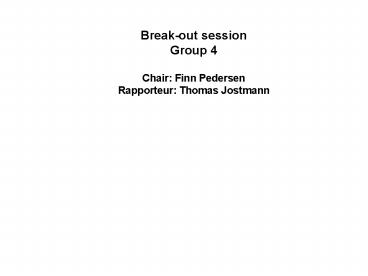Breakout session - PowerPoint PPT Presentation
1 / 7
Title:
Breakout session
Description:
... that tackles the processes e.g. mixing or filling 'flame retardant' is not a use but a function of a ... Redundant text with the main part should be avoided ... – PowerPoint PPT presentation
Number of Views:32
Avg rating:3.0/5.0
Title: Breakout session
1
Break-out session Group 4 Chair Finn Pedersen
Rapporteur Thomas Jostmann
2
- Group 4
- 1. question
- Work out an example (or options) how the use of a
substance should be described under section 1.2
of the safety data sheet. - Sect. 1.2 definition
- Only the most and common uses of a substance need
to be described (brief description of what it
actually does) and listed. - General discussion
- use definition in REACH is very broad that
tackles the processes e.g. mixing or filling - flame retardant is not a use but a function of
a substance - the use normally creates an exposure whereas the
function not necessarily defines an exposure - in the DU sectors additional information is
needed regarding the handling information
(filling / mixing ... is sometimes not detailed
enough)
3
- How to use section 1.2 of the SDS to specify the
use? - First option (preferred by the group)
- Starting with a broad IC approach (industrial,
professional, consumer) - Optionally Industry category may help guiding
the DU to find their uses in the eSDS - Optionally function of the substance if it
helps - Optionally further information about uses and
handling processes - Information for the next level in the supply
chain should be clear enough to signal that the
eSDS is the right one for this particular
industry to be used ? the next level of eSDS
covering DU uses would be for the formulator to
describe in more detail ? would result in
cascade of ES
4
- Second option
- M/I sells directly to a DU this may require a
specific eSDS to describe the exposure - M/I sells to the formulator F will be able to
draft a specific eSDS which is reflecting the
conditions of specific DU uses - Third option
- start with main uses and add minor uses on as
needed basis if specific uses are to be
covered
5
- Work out a proposal how the information in
Section 7 and 8 of the eSDS for the dangerous
substance should relate to the information in the
ES annex. This should cover - DNELs/PNECs
- Operational conditions of use (relevant to
health and environment) - RMMs related to workers, consumers and
environment - Any other information related to exposure
assessment - Some conflictual views
- Keeping the data in the main part of the SDS as
an overview and make it optional to put it in the
ES annex as well. - Redundant text with the main part should be
avoided - From the practical point of view of a F all
information should be in the ES annex - Section 7 is information which may go into
technical information - Section 8 need to be very specific as this is
providing the relevant information
6
General recommendations Use of the SDS is
already established along the value chain,
changing content of information would mean that
this established way of using information would
need to be changed Not all SDS will have an
annex avoid 2 different types of SDS main parts
with and without annex Do not change the main
content of the sections and simply add PNEC and
DNEL information way of presenting this in the
SDS should be flexible (table or individual)
RMMs not coming from the substance ES but from
other regulation should be reflected in the
assessment for preparations and be reflected in a
consistent way in the main part and the annex In
section 8 there should be the most relevant and
general RMMs mentioned
7
- Where to put operational conditions of use?
- not needed in the SDS main part but in the ES
annex































